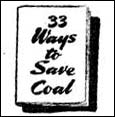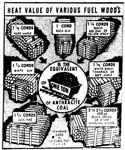At the same time that the government program got underway, three of the Island's largest retailers - R. T. Holman Ltd and Sinclair & Stewart Ltd of Summerside, and Moore & MacLeod of Charlottetown - began to sponsor a full-page ad on the back page of the Summerside Journal called "Their Sacrifice - Your Response." It was a special information service directed to householders to help them adapt to the wartime situation. Each feature contained a section about the sacrifice of military personnel and another section was devoted to several ways in which a person on the home front could respond. The first ad appeared 11 March 1943.
The second one to be published contained a report of the new conservation program and its goals.
In March another ad urged everyone to "Make this your motto for 1943 - Eat it up - Wear it out - Make it do." In April consumers were told why certain commodities were not being manufactured and in May the series extolled the role of a housewife. The format changed in November, but it continued to bring the same type of helpful information to Summerside citizens until early 1944.
The matter of providing fuel for heat became a concern of the government in 1942. Oil restrictions meant that about 25 houses in Summerside that had been using oil furnaces were required to switch to another type of heat. Coal was the most common form of fuel, although wood was also used in the town. Coal was brought in by railway car and ads placed in 1942-43 by local dealers such as Joseph Read & Co. and R. T. Holman Ltd. encouraged people to order as soon as possible to ensure they had a supply for the winter.
 The government ran ads exhorting homeowners to use coal wisely. A booklet on "33 Ways to Save Coal" was offered by the Department of Munitions and Supply. Another called "Make Your Furnace Fight" was issued by the WPTB. The coal situation was still being closely watched in December 1945. The fuel controller for the province explained the shortage being experienced and advised citizens not to attempt to hoard.
The government ran ads exhorting homeowners to use coal wisely. A booklet on "33 Ways to Save Coal" was offered by the Department of Munitions and Supply. Another called "Make Your Furnace Fight" was issued by the WPTB. The coal situation was still being closely watched in December 1945. The fuel controller for the province explained the shortage being experienced and advised citizens not to attempt to hoard. In regard to wood, the same department issued a chart to illustrate the heat value of various types of trees as compared to coal. Dealers were advised to sell only by the cord or part thereof and to abide by the price ceiling established in 1941. As the war went on, lack of farm labour made it more likely for families in rural area to burn coal.
In regard to wood, the same department issued a chart to illustrate the heat value of various types of trees as compared to coal. Dealers were advised to sell only by the cord or part thereof and to abide by the price ceiling established in 1941. As the war went on, lack of farm labour made it more likely for families in rural area to burn coal. There were other commodities in short supply, but none that seemed to have any serious impact on the citizens of Summerside. By September 1942 over 400 articles containing metal were on a prohibited list. The production of household items such as washers, refrigerators stoves, small appliances, radios, and clocks were greatly restricted because raw materials flowed into war industries.
There were other commodities in short supply, but none that seemed to have any serious impact on the citizens of Summerside. By September 1942 over 400 articles containing metal were on a prohibited list. The production of household items such as washers, refrigerators stoves, small appliances, radios, and clocks were greatly restricted because raw materials flowed into war industries.Leather became restricted and thus new shoes were sometimes difficult to acquire. Many textiles were diverted to military use, styles were altered to compensate, and items such as silk stockings that women had once enjoyed were curtailed. Two films shown at the High School by the WPTB in October 1943 were titled, "Make It Over" and "Women are Warriors."
| Related Articles | Related Images | Related Memories | Related Websites | Inflation Calculator |
| Home Page | Site Map | Contact Us | Wyatt Heritage Properties |








